In a narrow alley in Bab El Bahr stood five women surrounded by miniatures of horses and dolls, bordered by colors, gelatin pumps, and glittery and sparkling decorations. Sharing laughs, they carefully adorned the miniatures, all made of sugar, as they bragged about their creations and creativity; the same way a fashion designer brags about their latest collection.
“This is happiness. We all have other jobs but this is a tradition for us to do every year, in this season. It’s joy for us, more than the money we earn,” Safeya, 37, told Ahram Online as she scrutinizingly adorned a doll’s eyes with a blue color; the same color as the eyeliner she was applying.
But unlike a catwalk, they don’t receive the standing ovations, as they race with time to finish their creations ahead of Moulid Al-Nabi, the Prophet Mohamed’s Birthday, a widely celebrated birthday among Sunni Muslim counties, and especially in Egypt.
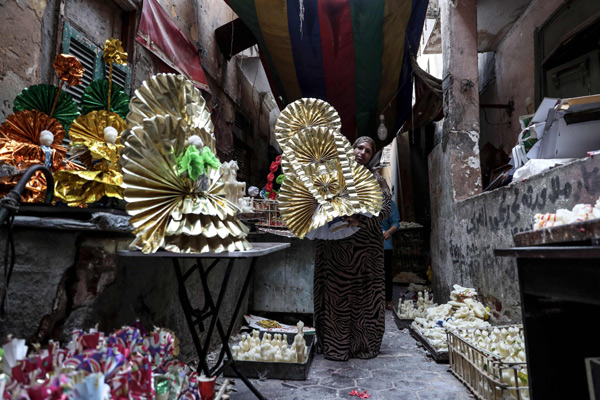
A woman decorates traditional sugar candy at a market in the capital Cairo on November 02, 2019, ahead of celebrations of the birthday of Prophet Mohammed, known in Arabic as "al-Mawlid al-Nabawi" (Photo: AFP)
A celebration that dates back to the Fatimid Caliphate’s ruling the 10th to 12th century AD, the traditions are pushing for survival as the industry faces obstacles due to a declining demand and harsh economic conditions in the 100 strong million populous country.
The celebration of the Prophet Muhammad’s birthday is on 12 Rabei Al-Awwal in the Islamic lunar calendar, which falls this year on 9 November.
“You feel the joy of the Moulid. You do something that everyone awaits; so just that would make you joyful, even if things change. Everything changes,” another woman, who asked to remain unidentified, said.
The women said they try to upgrade their creations, perhaps making a sugar miniature of a mosque, or even a ship.
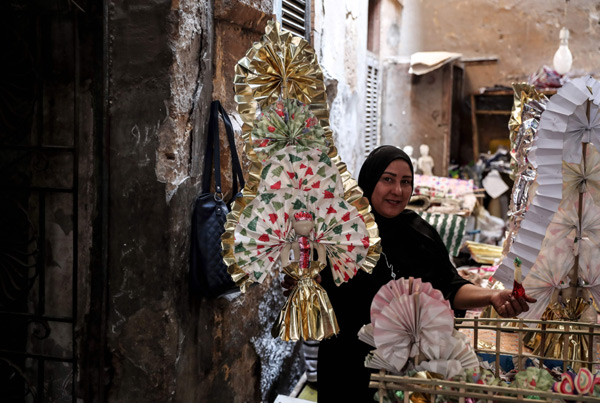
An Egyptian woman shows traditional decorated sugar statuettes in the capital Cairo on November 2, 2019, ahead of celebrations of the Muslim Prophet Mohammed's birthday, known as "Al Mawlid Al Nabawi". (Photo: AFP)
“It’s only in rural areas now. Most people will want to get it; but unfortunately they will resort to plastic as it’s more available. Some would still choose to get the sugar sculptures because they’re cheaper,” she added.
A price of a doll would begin from EGP 10, incorporating around 100 grams of sugar, and extending to a higher EGP 75-100, and even more depending on their size.
A price of a horse would start at the same range and can jump to EGP 750 on a customer’s request.
‘Limited resources, but only the best’
But as the women were busy decorating the dolls, stood the factory’s owner, Mohamed Saad, nearby supervising his crew of men on other iconic creations for the Moulid; at least ten kinds of sweets, many cooked using nuts and sugar, which continue to survive to mark the birthday.
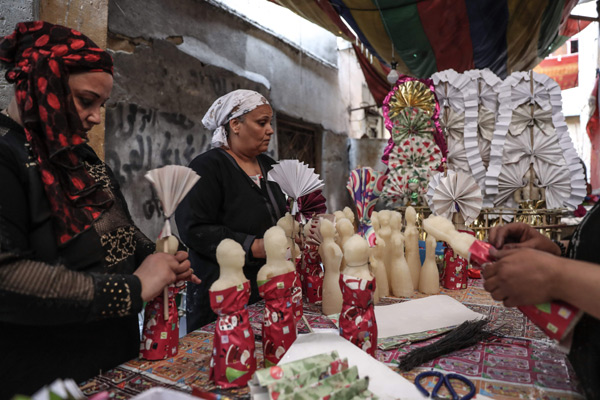
Egyptian women decorate traditional sugar statuettes in the capital Cairo on November 2, 2019, ahead of celebrations of the Muslim Prophet Mohammed's birthday, known as "Al Mawlid Al Nabawi". (Photo: AFP)
Despite the limited resources of the factory; only a couple of massive melting pans, a number of gas cylinders, and old sacks of sugar, the beehive was racing to deliver the candid creations: Semsemeya, Fouleya, and many others.
A worker adamantly continued to stir peanuts into sugar using a wooden spatula, another continued to cut large rectangles of sesame into small bars, with another across the factory working on bringing the dolls and horses to life through pouring a sugary mix into a wooden template of the same sculptures.
“All fresh, all the best. Not like the others,” Saad said, in reference to other outlets selling the candied favorites at soaring prices.
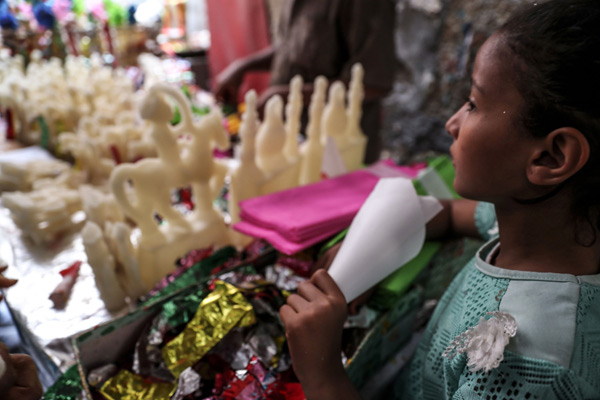
An Egyptian child gazes at statuettes made from sugar in front of a candy factory in the capital Cairo on November 2, 2019 (Photo: AFP)
The Horse and the Doll has been largely depicted in movies, mainly in iconic Shay’ Men El Khof, or a Taste of Fear, but unfortunately for some traders, the industry is fading, as new generations continue to fall to grasp the landmark icon of the celebration.
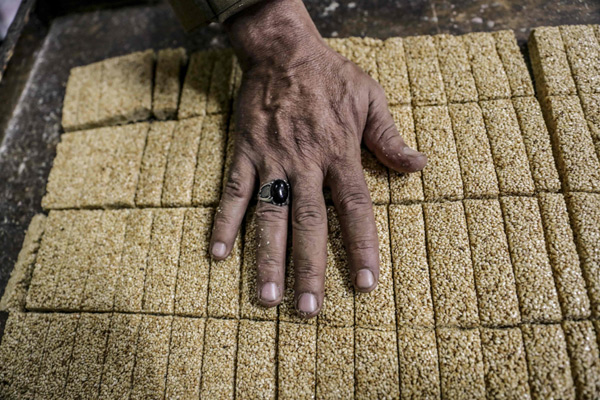
An Egyptian confectioner shows bars of sweets with sesame at a candy factory in the capital Cairo on November 2, 2019 (Photo: AFP)
In Bab El-Bahr, prominent traders in the iconic ‘halawa’ district displayed their products for this season in colorful caravans and eye luring sweets; however, the flow remained inadequate, with a rare presence of the sugar sculptures.
“It’s always been produced here in Bab El-Bahr. It’s always been this way since the Fatimid Caliphate. It was born here,” Hassan El-Zaghat, a prominent trader in the alley, told Ahram Online about the historical aspect of the area.
El-Zaghat stood in front of his caravan, especially established ahead of the event, awaiting customers as he was surrounded with sweets…and plastic dolls, which have largely emerged in recent years as a replacement to the sugary doll and horse.
The plastic dolls, which raw materials are imported, have substituted El-Zaghat’s historical industry of sugar dolls in the past years.
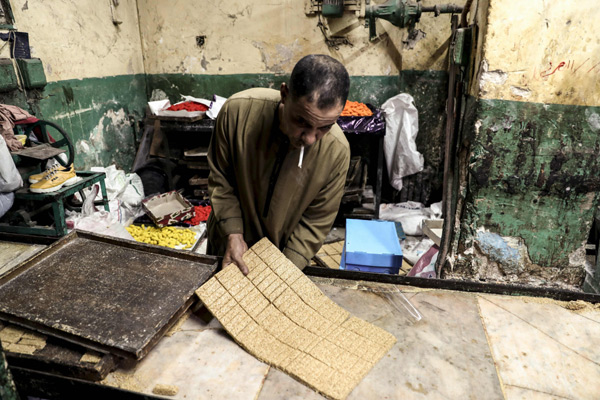
An Egyptian confectioner shows bars of sweets with sesame at a candy factory in the capital Cairo on November 2, 2019 (Photo: AFP)
“We don’t do it because the generations of workers who used to do it have faded,” El-Zaghat said, saying that he grew up seeing his mom creating them beautifully at home as a Fine Arts graduate.
However, he said that the sugary dolls were still making a comeback; with new generations getting the shock of being introduced to the icons, which date back to more than a 1000 years.
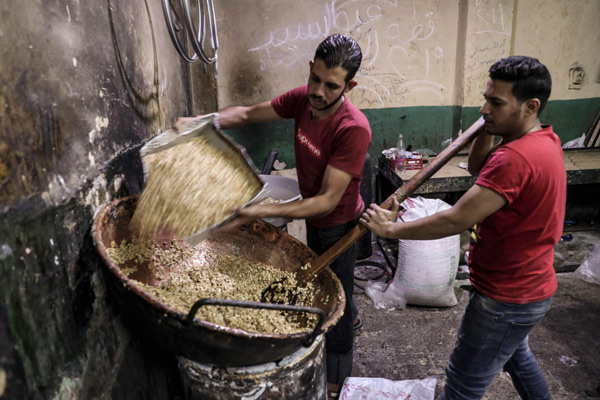
Egyptian confectioners add peanuts to melted sugar as they make sweets at a candy factory in the capital Cairo on November 2, 2019 (Photo: AFP)
Declining demand that wipes off Moulid’s joy?
El-Zaghat sells 1 kg of assorted sweets of a medium quality at EGP 35 ($2.17), yet his business is facing troubles as demand continues to fall.
The sweet-toothed country had been heavily hit with a sugar scarcity crisis in 2016, which left prices soaring amid austerity measures that left a third of the population living under poverty line.
The sugar dilemma has had its toll on the industry, leading to a 60% hike in prices at the time. However, prices never went down.
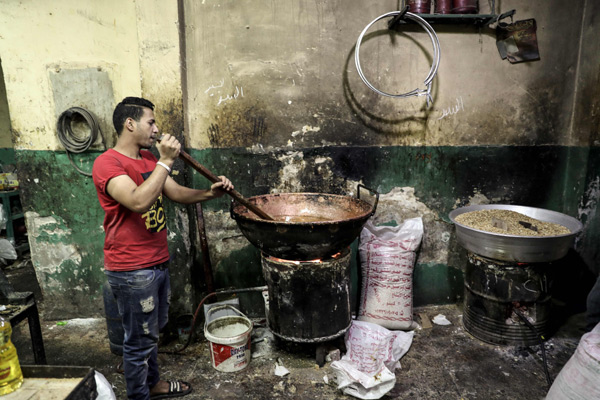
An Egyptian confectioner stirs a large pot of melted sugar at a candy factory in the capital Cairo on November 2, 2019 (Photo: AFP)
“Despite that prices haven’t changed, people are not buying. They don’t have money. On the contrary, there are prices which have actually declined in terms of raw materials, but they’re still not purchasing,” he said, describing it as “horrible, more than you can imagine”.
El-Zaghat said that the industry would be very lucky if they were able to generate profit for 15 days in total ahead of the Moulid, a setback from a previous celebration which saw three months of preparations ‘in the old days’.
‘Not our speciality’ VS ‘New Creations’
Some of the country’s prominent sweets manufacturers set the price of their Halawa starting from EGP 200 ($12.38) and extending to around EGP 950 ($58.81) per box, depending on size.
A manager of an upper class desserts shop who asked to remain anonymous, told Ahram Online that turnout was ‘moderate’, yet they wouldn’t choose to switch off their own creations of desserts to focus on the Halawa.
“Halawa is not our speciality. We don’t have the luxury of abandoning our own specialties like the others. We just have it because we want to keep our customers so they don’t turn away to others,” he said.
Other brands have pushed with a new marketing mechanism: sugar-free substitutes.
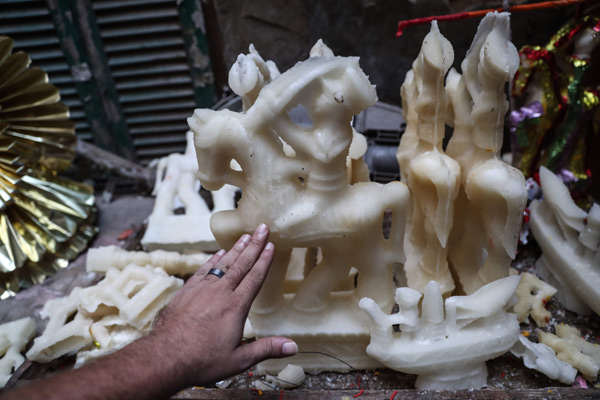
Decorated traditional sugar statuettes are ready to be decorated in the capital Cairo on November 2, 2019, ahead of celebrations of the Muslim Prophet Mohammed's birthday, known as "Al Mawlid Al Nabawi" (Photo: AFP)
Long stand brand Tseppas introduced sugar-free halawa, which relies on substituting sugar with honey in the high caloric sweets.
Others, like Diet House, have decided to incorporate oats as a replacement to the nuts.
Egyptians largely depend on sweet desserts to mark their celebrations, including Kahk in Eid, Halawa in Moulid, and others; despite harsher economic conditions.
“The industry will never disappear. It’s impossible. This would never happen. We’re hoping for a breakthrough in the next few days, so people would feel the delight of the Moulid,” Zaghat said.
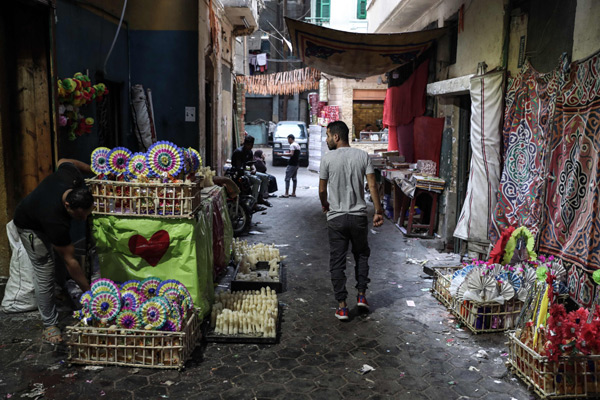
An Egyptian man walks through an alley where traditional decorated sugar statuettes are lined up in the capital Cairo on November 2, 2019 (Photo: AFP)
Short link: